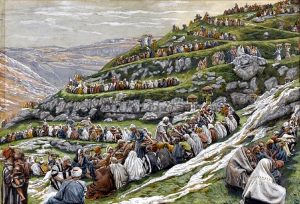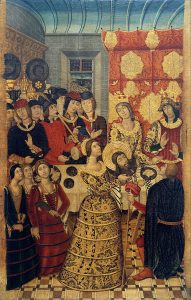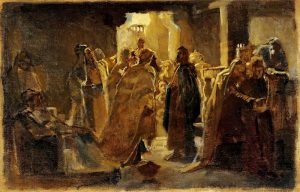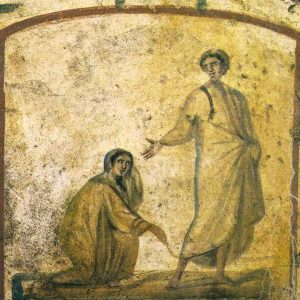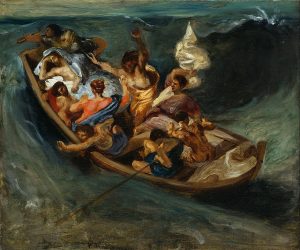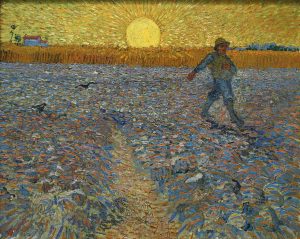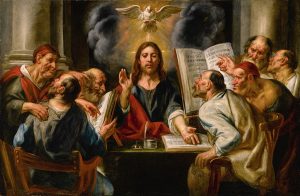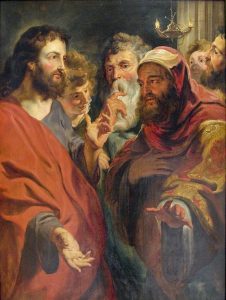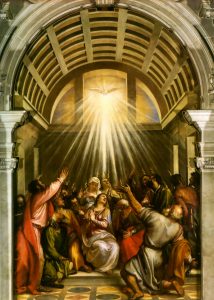Thoughts on Sunday’s Lessons for July 25, 2021
First Reading (Track One): 2 Samuel 11:1-15
If you wondered why the Lectionary skipped over the story of Jesus feeding the multitude in Mark’s Gospel last Sunday, this week provides the answer: We get John’s account of the loaves and the fishes instead, as our Gospel readings take a midsummer turn to John and the bread of life for the next several weeks.
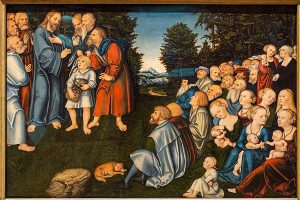
The Miracle of the Five Loaves and two Fish (1547-1548), oil painting on linden wood panel by Lucas Cranach the Elder, (1472-1553). National Museum of Fine Arts, Stockholm, Sweden. (Click image to enlarge.)
Before we get to the Gospel, though, our Track One first reading opens a dark chapter in the life of King David. In spite of the fame that David earned through his kingship and victories as a warrior, when he was bad, he was very, very bad. He is so attracted by the sight of beautiful Bathsheba bathing on her roof that he summons her, rapes her – no kinder term will serve for a person in his power taking her without her consent – and then arranges for the death in battle of her husband, Uriah, so he can take her.
First Reading (Track Two): 2 Kings 4:42-44
Just about everyone enjoys the story about the time that Jesus fed a crowd with loaves and fishes that mysteriously multiply to more than fulfill the need. This is surely one of the most familiar Gospel stories. In fact, it is Jesus’ only miracle that is told in all four Gospels; we hear John’s version on Sunday. You may not be so quick to recall the similar story of the Prophet Elisha feeding a similar, if smaller, multitude, though! Faced with a crowd of hungry people, Elisha directed that they be fed from a sack of food that a man had brought to sacrifice. He had only 20 loaves and a bit of grain for 100 people, which didn’t seem like much. But with God’s help it proved to be more than enough. Just as in the Gospel stories, there were even leftovers.
Psalm (Track One): Psalm 14
Psalm 14 resonates with David’s heinous behavior in the first reading. The Psalmist, speaking in the voice of a disappointed king, laments that the people have turned faithless and corrupt, foolishly denying God as they commit abominable acts. God looks down to see if any wise people remain, but there are none. But even in these times of evil, the Psalmist sings, God remains with the righteous. God is the refuge of the just, and eventually will deliver the people and restore their fortunes.
Psalm (Track Two): Psalm 145:10-19
Like many of the Psalms, this hymn of praise and thanksgiving expresses gratitude to a God who is not only powerful but faithful and merciful too. God is always prepared gently to lift up those who fall and to support those who are oppressed, we hear in this portion of Psalm 145. Echoing the bounty that God provided for the hungry people in the Ezekiel reading and the hungry crowd that we will see on the mountainside in John, the Psalmist, too, celebrates God who gives us food; whose outstretched hands satisfy every living creature.
Second Reading: Ephesians 3:14-21
In Sunday’s passage from the letter to the Ephesians we hear the author kneel before God to lift up a prayer for the people being addressed: He prays that the people of Ephesus may receive strength through the Holy Spirit and have Christ living in their hearts through faith. Then this selection closes with a beautiful blessing that the Book of Common Prayer offers as a benediction in Morning and Evening Prayer: “Glory to God whose power, working in us, can do infinitely more than we can ask or imagine.”
Gospel: John 6:1-21
Starting Sunday and continuing through the month of August, our gospel readings will turn from our year with Mark to visit the sixth chapter of John, in which Jesus discourses at length about the bread of life. We begin with John’s version of the familiar story of the loaves and fishes. John hints at the Eucharist in his account, in which Jesus blesses the bread, then distributes five barley loaves and two fish to 5,000 people. Somehow this small portion feeds everyone abundantly, with more left over than they had to start with. The crowds are so amazed that they clamor to make Jesus king, but he slips away, catching up with the startled disciples by walking miles across the water to join them in their boat.

